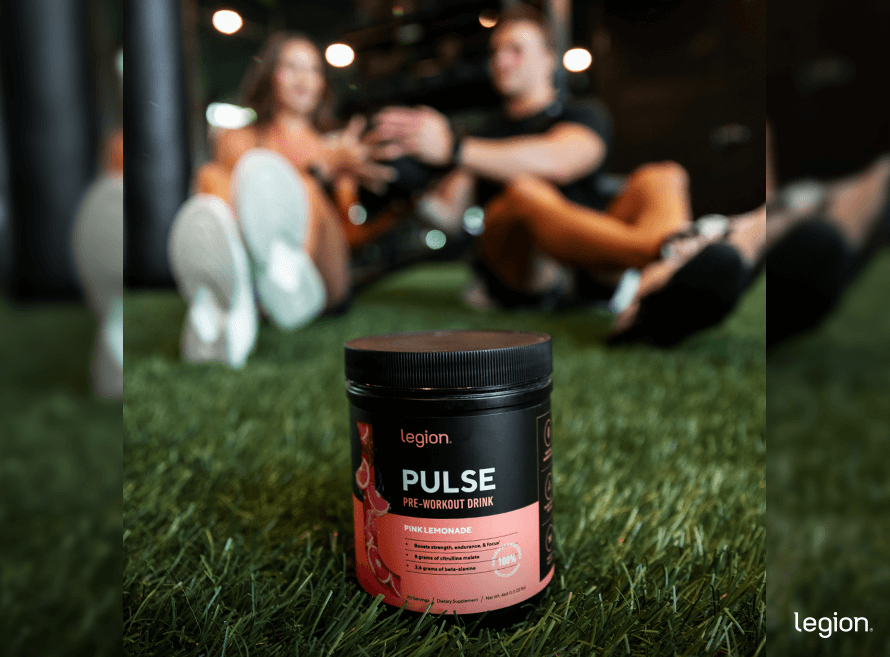
Do you need more caffeine or do you just need to go for a walk?
Sometimes, the latter is all it takes to feel more awake. Other times—like before a workout—you need something stronger.
And when that time comes, most gymgoers reach for one of two things: pre-workout or an energy drink.
Pre-workout supplements are made for the gym. They’re packed with ingredients that boost strength, endurance, and focus—effects you can actually feel once you start training.
Energy drinks, on the other hand, aren’t made specifically for physical performance. Instead, they’re designed to provide a quick burst of energy whenever you need it—whether you’re training, studying, or just trying to get through the afternoon.
In this article, you’ll learn how pre-workouts and energy drinks differ, what each does best, and how to decide which is right for you.
Key Takeaways
- Both pre-workouts and energy drinks boost energy and focus, but pre-workouts typically contain higher doses and specialized ingredients designed to enhance athletic performance.
- Pre-workouts are the better choice for maximizing workout performance.
- Energy drinks are ideal for a quick, convenient energy boost and improved focus.
- For a milder caffeine kick without specialized performance-enhancing ingredients, energy drinks can work as a pre-workout substitute.
- The best pre-workout energy drinks feature clinically effective doses of ingredients like caffeine, L-theanine, and taurine, taste great, and avoid artificial additives—like Legion’s energy drink.
The Benefits of Using Pre-Workout or Energy Drinks
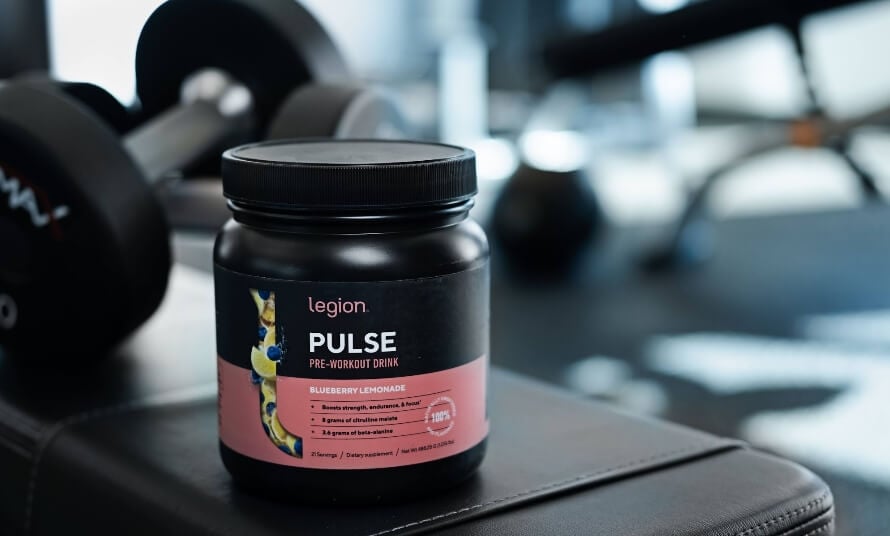
Most pre-workout and energy drinks contain compounds that boost energy, focus, and mental and physical performance. While these effects are beneficial in many settings, they’re particularly valuable during workouts.
Let’s explore these key benefits, how pre-workout and energy drinks deliver these effects, and why they help.
Increased Energy
Caffeine is typically the primary ingredient in pre-workouts and energy drinks. It features so heavily because it boosts wakefulness, alertness, and energy—three factors that can make early morning or post-work workouts feel more manageable.
Energy drinks also often contain large servings of sugar and other stimulants, such as ginseng, guarana, and yerba mate, for an added energy kick.
Enhanced Focus
Another reason most energy drinks and pre-workout supplements contain caffeine is it enhances your focus.
Unfocused training can be a setback for several reasons: When you’re not “locked in,” you’re more likely to use sloppy form, “sandbag,” and feel disconnected from your training. This can slow your progress, increase your risk of injury, and make your workouts feel tedious.
In contrast, training with focus helps you make faster progress, stay injury-free, and enjoy your workouts more.
Many pre-workouts and some energy drinks also contain nootropics like L-theanine, CDP-choline, and taurine. These compounds sharpen focus even further and can counteract some of caffeine’s downsides (jitters and anxiety, for example) while amplifying its benefits.
Better Athletic Performance
Caffeine’s benefits go beyond boosting energy and focus—it also enhances strength, power, endurance, and aerobic performance. And that’s yet another reason why all the best pre-workouts and energy drinks contain a hefty dose of caffeine.
Unlike energy drinks, pre-workout supplements also include compounds that boost athletic performance in other ways. Ingredients like citrulline malate, beta-alanine (the ingredient responsible for “pre-workout itch”), alpha-GPC, and betaine help reduce fatigue, increase exercise capacity, and further improve strength, power, and endurance.
Improved Cognition
Pre-workouts and energy drinks often include ingredients that enhance cognitive function: nootropics like CDP-choline, L-theanine, B vitamins, and taurine work together to sharpen memory, increase mental clarity, improve mood, and reduce mental stress.
These effects are valuable in the gym because they help you stay sharp, focused, and motivated—even when fatigue sets in. By boosting your mood and reducing stress, they make it easier to start and power through workouts you’d rather skip, helping you to stay consistent.
What’s the Difference Between Pre-Workout and Energy Drinks?
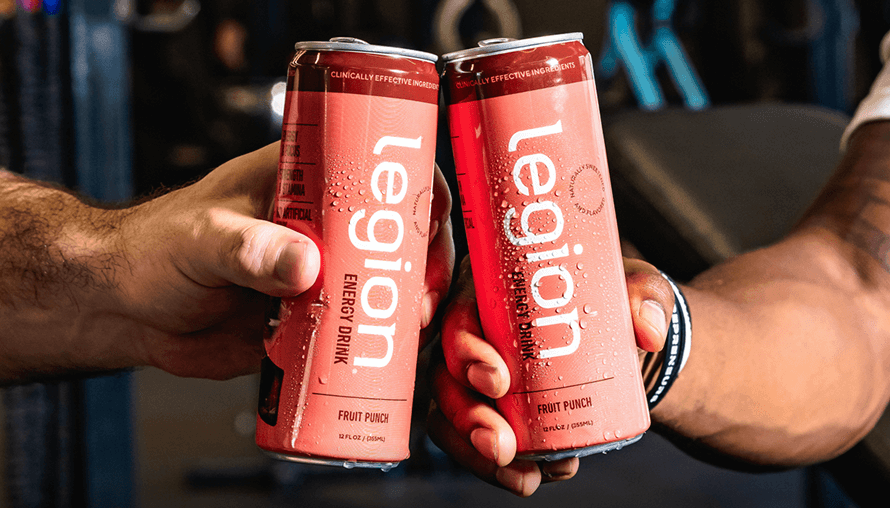
Pre-workouts and energy drinks might seem similar at first glance—they both give you a quick energy boost and often contain caffeine—but they’re designed for different purposes and have distinct effects.
Let’s explore these differences now.
Ingredients
Pre-workouts contain ingredients specifically to boost athletic performance and, sometimes, recovery. That is, their sole purpose is to help you lift heavier, train longer, and recover faster.
In contrast, energy drinks provide a quick boost of energy, but their ingredients aren’t only for athletes. In other words, they’re a “general-purpose” energy booster—great for workouts but equally useful for weary workers, sleepy students, or anyone needing a quick pick-me-up.
The table below shows how the ingredient profiles of a pre-workout like Pulse compare to Legion’s energy drink:
PRE-WORKOUT VS. ENERGY DRINKS: INGREDIENTS
| Pulse | Legion Energy Drink | |
|---|---|---|
| Caffeine | 350 mg | 150 mg |
| L-Theanine | 350 mg | 150 mg |
| Citrulline Malate | 8 g | 0 g |
| Beta-Alanine | 3.6 g | 0 g |
| Alpha-GPC | 300 mg | 0 g |
| Betaine | 2.5 g | 0 g |
| Citicoline | 0 g | 250 mg |
| Taurine | 0 g | 2,000 mg |
| B Vitamins | 0 g | 27.4 mg |

As you can see, Pulse includes higher doses of performance-enhancing ingredients like citrulline malate, beta-alanine, and betaine, which are ideal for improving strength, endurance, and power.
The energy drink, on the other hand, skips those and emphasizes ingredients that boost alertness and focus, such as L-theanine, citicoline, taurine, and B vitamins.
Potency
As a general rule, pre-workouts provide larger doses of performance-enhancing ingredients than energy drinks.
This reflects their purpose: pre-workouts are for maximizing athletic performance, while energy drinks are a convenient tonic for anyone who’s tired.
Use
Pre-workout and energy drinks usually have very different usage instructions.
Most pre-workout manufacturers suggest taking it about 30 minutes before training to ensure it “kicks in” right when you start your workout.
Energy drinks, however, don’t require precise timing. You can drink them whenever you need to quickly lift your energy levels.
Convenience
Pre-workouts usually come in powder form that you mix with liquid, so they take a little time to prepare. The benefit is that you can adjust the dosage depending on your needs—you can take more before intense training sessions (like one-rep max testing workout) and less for lighter workouts (like during a deload week).
Energy drinks, on the other hand, are pre-packaged (usually canned), ready to drink, and often more affordable. This makes them more convenient but less customizable.
Cost
Pre-workout supplements usually cost more than energy drinks because they contain higher doses of more ingredients, many of which are specialized compounds designed to optimize athletic performance.
Is Pre-Workout Healthier Than Energy Drinks?
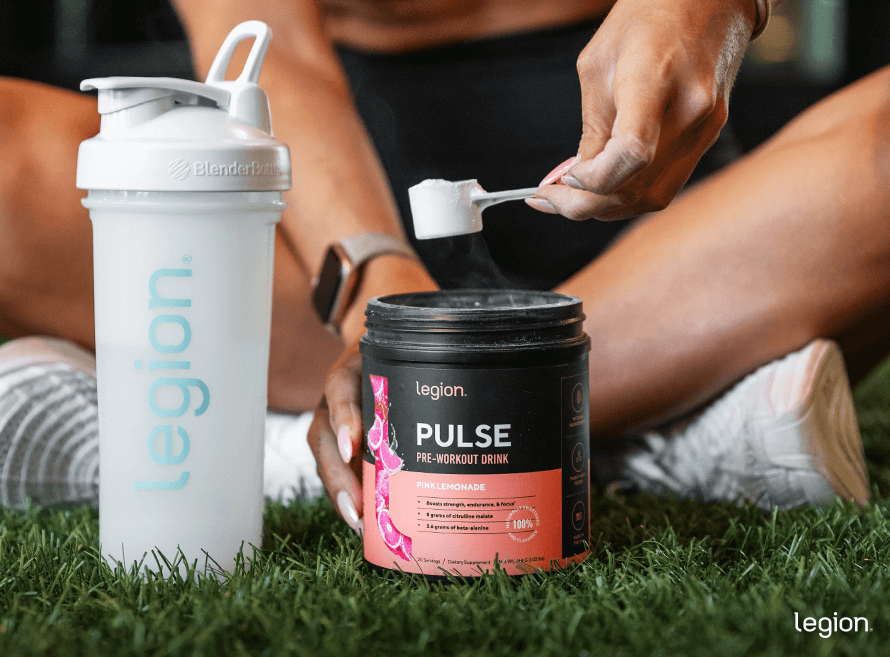
Neither pre-workouts nor energy drinks are inherently “healthy” or “unhealthy.”
Energy drinks often get a bad rap because they’ve been linked to health issues like elevated heart rate, high blood pressure, sleep disturbances, anxiety, and—in rare cases—cardiac problems.
Importantly, though, these effects almost always occur when people overconsume them (think multiple cans per day) or mix them with alcohol, not from having the occasional can.
Pre-workouts can have their own pitfalls, too. Some shady supplement companies have been caught spiking formulas with banned stimulants or over-dosing ingredients that, when consumed in excessive amounts, can harm your health.
Fortunately, it’s easy to sidestep these issues.
As long as you use energy drinks as intended—moderately and without alcohol—you’re unlikely to run into problems. Likewise, if you buy third-party tested pre-workouts from reputable brands that disclose their ingredient doses, you can safely enjoy the benefits without issue.
Can You Use Pre-Workout as an Energy Drink?
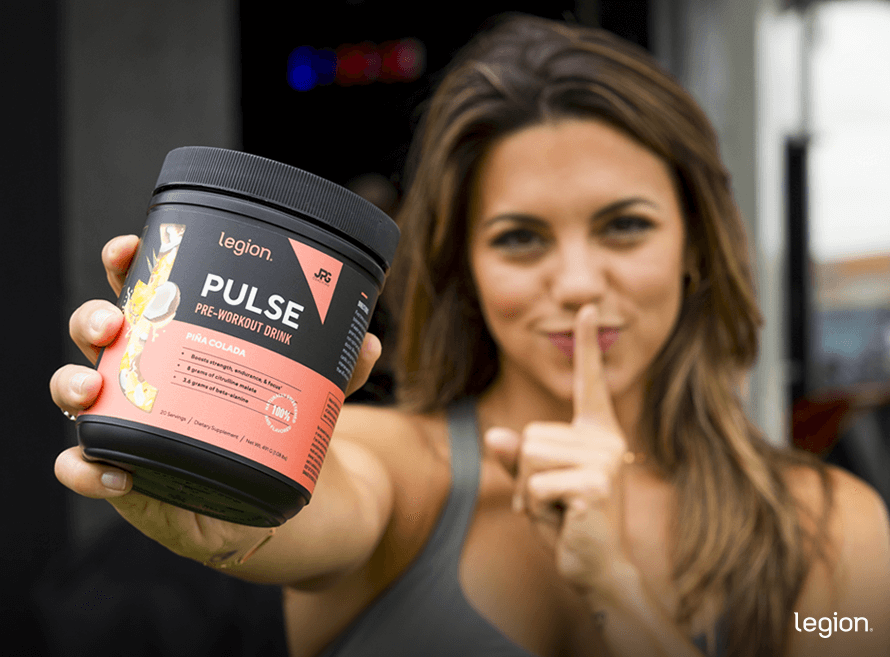
You could—but it’s probably not the best idea.
Pre-workout supplements are formulated to support intense exercise, not to replace your morning coffee or serve as an afternoon pick-me-up. As such, they typically contain much higher doses of caffeine than an energy drink—enough to boost workout performance, but more than most people need for everyday energy.
They also include ingredients like beta-alanine, citrulline, and betaine, which help improve strength, endurance, and power in the gym but offer little benefit outside of it—at least from an energy or focus standpoint.
In other words, using pre-workout as an energy drink is overkill. You’ll likely get more caffeine than you need, and the extra ingredients don’t add much value if you’re not training.
In fact, they can sometimes work against you: pre-workouts are more likely to cause stomach discomfort (thanks to the extra caffeine), and those containing beta-alanine may make your skin itch—hardly ideal when you’re just trying to focus or get through the workday.
Can You Use Energy Drinks Before Workouts?
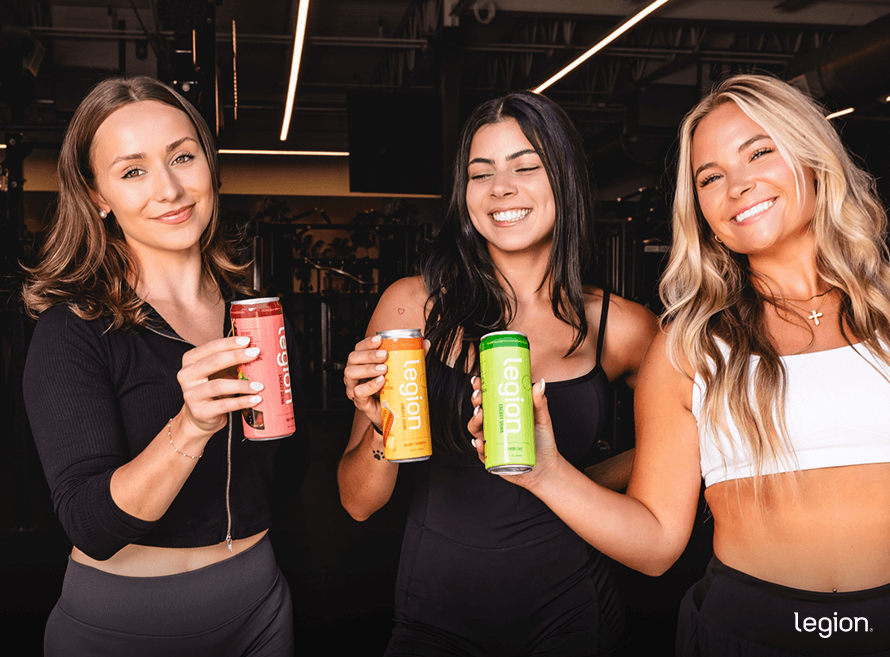
Yes—especially if you’re sensitive to caffeine or prefer to avoid large doses.
They’re also a nice option if you just want a mild boost or a quick wake-me-up before training without all the extra performance enhancers that come with pre-workout.
Just keep in mind that energy drinks won’t give you quite the same performance edge as a dedicated pre-workout.
Pre-Workout vs. Energy Drinks: Which Is Best for You?
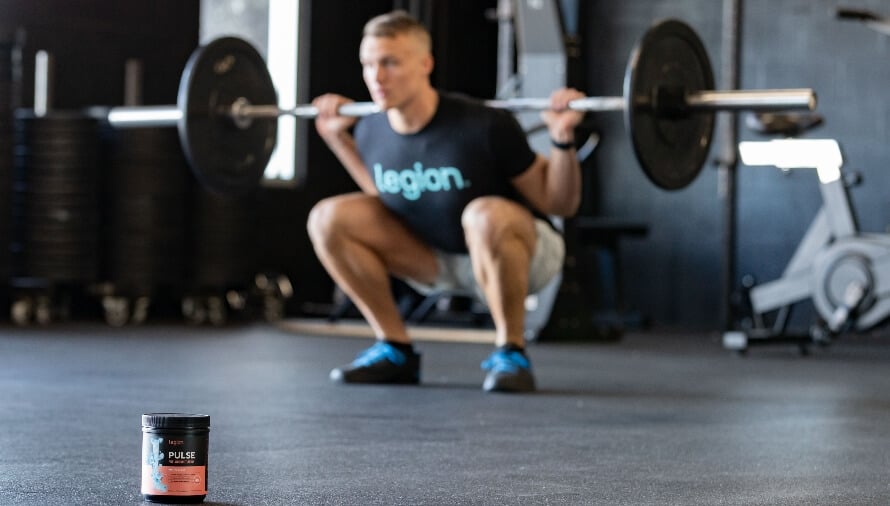
The first question to ask when choosing between pre-workout and energy drinks is: What’s your goal?
If your priority is boosting workout performance—lifting more weight, doing more sets and reps, and fighting fatigue—pre-workout is your best bet. Pre-workouts deliver higher doses of ingredients specifically designed to enhance performance, making them ideal for those looking to optimize their training.
However, if you’re looking for a quick, convenient energy and focus boost, an energy drink could be a better choice.
Energy drinks can also serve as a pre-workout substitute if you just need a mild caffeine kick to wake you up, without the added performance-boosting ingredients found in pre-workouts.
Likewise, you may prefer drinking energy drinks for gym workouts if you’re sensitive to stimulants and want to avoid large doses of caffeine.
FAQ #1: What’s the best energy drink for workouts?
To be considered the best workout energy drink, a product must:
- Contain clinically effective doses of caffeine for increased energy and performance, and nootropics for more focus, attention, and mental clarity
- Include ingredients that offset the downsides of caffeine, such as L-theanine and taurine
- Taste great
- Be naturally sweetened and flavored and free from artificial food dyes, preservatives, fillers, or other chemical junk
- Be analyzed for purity and potency in an accredited lab
- Have a clean and transparent label showing exactly what’s in every serving and what’s not (no proprietary blends or hidden ingredients)
For a product that meets all these criteria, try Legion’s energy drink.
FAQ #2: Is pre-workout better than energy drinks?
It depends on your goals. Pre-workouts are ideal if you’re looking to boost athletic performance—they provide larger doses of ingredients that enhance strength, endurance, and power.
Energy drinks, on the other hand, are a convenient way to shake off fatigue and dial up your cognitive sharpness, whether you’re heading to the gym or tackling a mentally demanding task.
FAQ #3: Why don’t energy drinks work on me?
There could be a few reasons why you don’t feel the effects of energy drinks.
One common factor is tolerance—if you regularly consume caffeine, your body may get used to it, making it less effective over time.
Genetics also play a role—some people naturally metabolize caffeine more quickly than others, reducing its impact.
Lastly, not all energy drinks have clinically effective doses of active ingredients, so double-check the label to ensure it contains enough caffeine and other focus-boosting compounds for a noticeable effect.
Want More Content Like This?
Check out these articles:
Scientific References +
- Irwin, Christopher, et al. “Effects of Acute Caffeine Consumption Following Sleep Loss on Cognitive, Physical, Occupational and Driving Performance: A Systematic Review and Meta-Analysis.” Neuroscience & Biobehavioral Reviews, vol. 108, Jan. 2020, pp. 877–888, www.sciencedirect.com/science/article/pii/S0149763419307377, https://doi.org/10.1016/j.neubiorev.2019.12.008.
- Guest, Nanci S., et al. “International Society of Sports Nutrition Position Stand: Caffeine and Exercise Performance.” Journal of the International Society of Sports Nutrition, vol. 18, no. 1, 2 Jan. 2021, jissn.biomedcentral.com/articles/10.1186/s12970-020-00383-4, https://doi.org/10.1186/s12970-020-00383-4.
- Costantino, Andrea, et al. “The Dark Side of Energy Drinks: A Comprehensive Review of Their Impact on the Human Body.” Nutrients, vol. 15, no. 18, 9 Sept. 2023, p. 3922, www.mdpi.com/2072-6643/15/18/3922, https://doi.org/10.3390/nu15183922.
- Angeliki Kapellou, et al. “Genetics of Caffeine and Brain-Related Outcomes – a Systematic Review of Observational Studies and Randomized Trials.” Nutrition Reviews, vol. 81, no. 12, 8 Apr. 2023, https://doi.org/10.1093/nutrit/nuad029.
